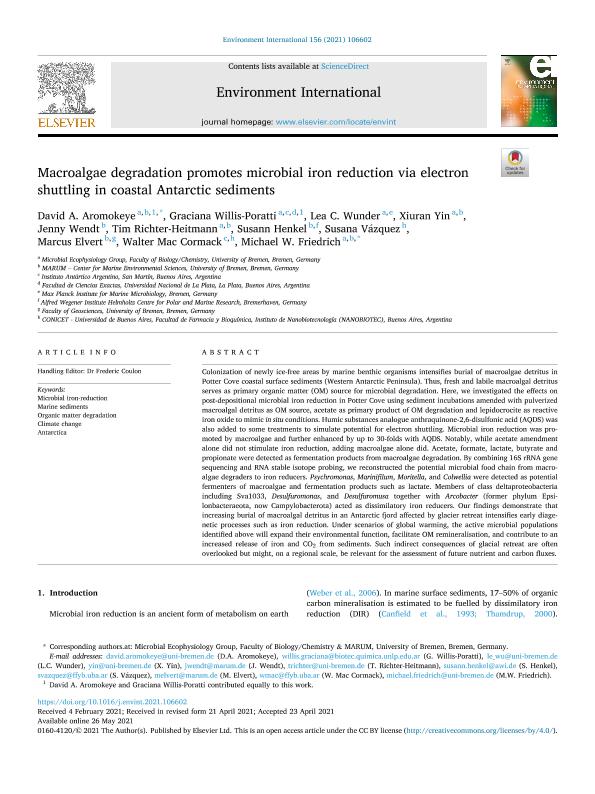Artículo
Macroalgae degradation promotes microbial iron reduction via electron shuttling in coastal Antarctic sediments
Aromokeye, David A.; Willis Poratti, Graciana ; Wunder, Lea C.; Yin, Xiuran; Wendt, Jenny; Richter Heitmann, Tim; Henkel, Susann; Vázquez, Susana Claudia
; Wunder, Lea C.; Yin, Xiuran; Wendt, Jenny; Richter Heitmann, Tim; Henkel, Susann; Vázquez, Susana Claudia ; Elvert, Marcus; Mac Cormack, Walter Patricio; Friedrich, Michael W.
; Elvert, Marcus; Mac Cormack, Walter Patricio; Friedrich, Michael W.
 ; Wunder, Lea C.; Yin, Xiuran; Wendt, Jenny; Richter Heitmann, Tim; Henkel, Susann; Vázquez, Susana Claudia
; Wunder, Lea C.; Yin, Xiuran; Wendt, Jenny; Richter Heitmann, Tim; Henkel, Susann; Vázquez, Susana Claudia ; Elvert, Marcus; Mac Cormack, Walter Patricio; Friedrich, Michael W.
; Elvert, Marcus; Mac Cormack, Walter Patricio; Friedrich, Michael W.
Fecha de publicación:
11/2021
Editorial:
Pergamon-Elsevier Science Ltd
Revista:
Environment International
ISSN:
0160-4120
Idioma:
Inglés
Tipo de recurso:
Artículo publicado
Clasificación temática:
Resumen
Colonization of newly ice-free areas by marine benthic organisms intensifies burial of macroalgae detritus in Potter Cove coastal surface sediments (Western Antarctic Peninsula). Thus, fresh and labile macroalgal detritus serves as primary organic matter (OM) source for microbial degradation. Here, we investigated the effects on post-depositional microbial iron reduction in Potter Cove using sediment incubations amended with pulverized macroalgal detritus as OM source, acetate as primary product of OM degradation and lepidocrocite as reactive iron oxide to mimic in situ conditions. Humic substances analogue anthraquinone-2,6-disulfonic acid (AQDS) was also added to some treatments to simulate potential for electron shuttling. Microbial iron reduction was promoted by macroalgae and further enhanced by up to 30-folds with AQDS. Notably, while acetate amendment alone did not stimulate iron reduction, adding macroalgae alone did. Acetate, formate, lactate, butyrate and propionate were detected as fermentation products from macroalgae degradation. By combining 16S rRNA gene sequencing and RNA stable isotope probing, we reconstructed the potential microbial food chain from macroalgae degraders to iron reducers. Psychromonas, Marinifilum, Moritella, and Colwellia were detected as potential fermenters of macroalgae and fermentation products such as lactate. Members of class deltaproteobacteria including Sva1033, Desulfuromonas, and Desulfuromusa together with Arcobacter (former phylum Epsilonbacteraeota, now Campylobacterota) acted as dissimilatory iron reducers. Our findings demonstrate that increasing burial of macroalgal detritus in an Antarctic fjord affected by glacier retreat intensifies early diagenetic processes such as iron reduction. Under scenarios of global warming, the active microbial populations identified above will expand their environmental function, facilitate OM remineralisation, and contribute to an increased release of iron and CO2 from sediments. Such indirect consequences of glacial retreat are often overlooked but might, on a regional scale, be relevant for the assessment of future nutrient and carbon fluxes.
Archivos asociados
Licencia
Identificadores
Colecciones
Articulos(NANOBIOTEC)
Articulos de INSTITUTO DE NANOBIOTECNOLOGIA
Articulos de INSTITUTO DE NANOBIOTECNOLOGIA
Citación
Aromokeye, David A.; Willis Poratti, Graciana; Wunder, Lea C.; Yin, Xiuran; Wendt, Jenny; et al.; Macroalgae degradation promotes microbial iron reduction via electron shuttling in coastal Antarctic sediments; Pergamon-Elsevier Science Ltd; Environment International; 156; 11-2021; 1-11
Compartir
Altmétricas



